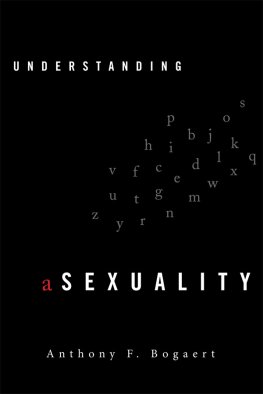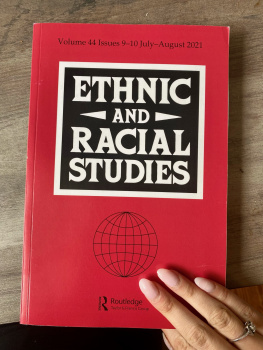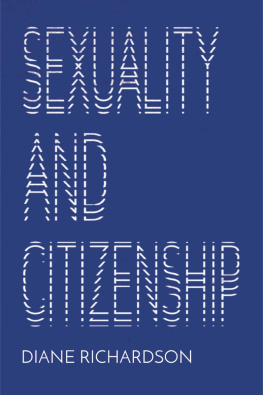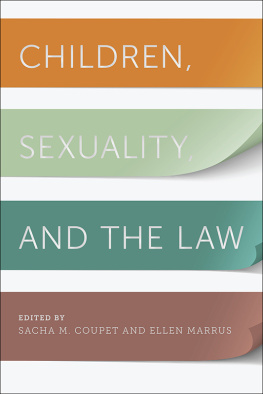LAW'S DESIRE
Law's Desire provides a critical examination of the relationship of law and sexual orientation in the United States, the United Kingdom and Canada. Law is one of the primary means through which lesbian and gay male sexualities are constructed, monitored and controlled (albeit not necessarily successfully). Carl Stychin exposes this connection through an exploration of key questions of current interest and controversy. He examines the motivations behind legal restrictions and their impact both upon sexual subcultures and dominant society.
The book tackles the major areas of controversy that have erupted in the 1980s and 1990s: public funding restrictions on homoerotic art; sodomy laws; the regulation of safe sex educational materials; gay pornography and feminist theory; lesbians and gay men in the American military; sadomasochism and the law; and legal restrictions on the promotion of homosexuality. The author concludes with an examination of the challenges posed by the newly emerging queer identities and the likely direction of future struggles.
Carl F. Stychin is Lecturer in Law at Keele University. He has written extensively in the areas of law and sexuality and legal theory. Educated in Canada and the United States, he served as a law clerk to the Chief Justice of Canada. He is co-editor (with Didi Herman) of Legal Inversions: Lesbians, Gay Men, and the Politics of Law.
LAW'S DESIRE
Sexuality and the limits of justice
Carl F. Stychin
First published 1995
by Routledge
2 Park Square, Milton Park, Abington, Oxon, OX14 4RN
Simultaneously published in the USA and Canada
by Routledge
270 Madison Ave, New York NY 10016
Transferred to Digital Printing 2006
1995 Carl F. Stychin
Typeset in Times by LaserScripi, Mitcham, Surrey
All rights reserved. No part of this book may be reprinted or reproduced or utilized in any form or by any electronic, mechanical, or other means, now known or hereafter invented, including photocopying and recording, or in any information storage or retrieval system, without permission in writing from the publishers.
British Library Cataloguing in Publication Data
A catalogue record for this book is available from the British Library
Library of Congress Cataloging in Publication Data
A catalogue record for this book has been requested
ISBN: 0-415-11126-9 (hbk)
ISBN: 0-415-11127-7 (pbk)
For my mother
CONTENTS
1 IDENTITIES, SEXUALITIES, AND THE
POSTMODERN SUBJECT : AN ANALYSIS OF
FUNDING BY THE NATIONAL ENDOWMENT FOR
THE ARTS
3 THE PORN WARS: FEMINISM AND THE
REGULATION OF GAY MALE PORNOGRAPHY
6 EQUALITY RIGHTS, IDENTITY POLITICS, AND THE
CANADIAN NATIONAL IMAGINATION
7 UNMANLY DIVERSIONS: THE CONSTRUCTION OF
THE HOMOSEXUAL BODY (POLITIC) IN LAW
ACKNOWLEDGEMENTS
This book has been written in various forms over the past four years. The ideas upon which it is based began life when I was a graduate student at Columbia Law School in the City of New York. I owe a debt of gratitude to all of those with whom I came in contact at Columbia for providing me with a stimulating environment in which to write. In particular, I thank Professor Kendall Thomas for all of his assistance and support. The book was finished in my first two and a half years as a full-time lecturer in the Department of Law at Keele University. I am fortunate to work in an institution that has generously provided the material resources and support which allowed me to complete the book. I also wish to thank all those who read and commented upon various chapters of the book in different forms over the years. They are now too numerous to mention individually. However, a few people stand out for their intellectual and emotional support above and beyond the call of duty: Shauna Van Praagh, Didi Herman, Audrey Macklin, Gillian More, Davina Cooper and Ren Provost. I also thank Mari Shullaw and Anne Gee at Routledge for their encouragement and advice.
I acknowledge permission given to reprint material which has previously been published in the following articles: Identities, Sexualities, and the Postmodern Subject: An Analysis of Artistic Funding by the National Endowment for the Arts, Cardozo Arts and Entertainment Law Journal, 1994, vol. 12, pp. 79132 ().
INTRODUCTION
This book is about the relationship between law and desire. More specifically, it is about how sexual desires are constituted and regulated by the law, with particular reference to gay male and, to a lesser extent, lesbian and bisexual sexualities. I attempt to uncover what the law desires which, I will argue, is the homosexual, against whom a coherent heterosexuality can be promoted through law. Throughout the book, I seek to demonstrate that the relationship of law and sexuality is complex and dynamic. While law may be (and has been) a repressive force, it also is a regulatory one which plays a role in constituting and maintaining coherent sexualities. At the same time, regulation is never entirely successful, for gaps and inconsistencies are left within legal discourse. This creates spaces for resistance against, and opposition to, the legal and sexual hegemony. I hope that this book provides one such intervention.
I should make clear at this juncture that I do not (and cannot) provide a singular truth in my examination of the sexual acts, sexual identities, and legal discourse upon which this book touches. My methodological approach is heavily indebted to a poststructural analysis that questions and interrogates such claims to universal truth. Moreover, I have not dealt in any sort of comprehensive way with many important issues, specifically those dealing with lesbian sexuality, the intersection of race and lesbian and gay sexualities, bisexuality, (dis)ability and sexuality, and, no doubt, numerous other identity-related issues. My belief, though, is that works such as this can be facilitative of an ongoing dialogue involving participants that historically have been denied the opportunity to express themselves fully within both dominant culture and the lesbian and gay communities.
To some extent, such a dialogue would have been unthinkable only ten years ago. The area of law and sexuality (which, I concede, often remains a handy euphemism for the relationship of law and lesbian, gay and bisexual sexualities) is a definite growth industry, as is lesbian and gay studies more generally in the academy. For those of us who spend a good deal of our time thinking and writing about these questions in law faculties, our greatest debt is owed to the emergence and institutionalisation of both feminist legal theory and critical race theory in recent years. Increasingly, voices from the margins have come to inhabit the centre of the university, and law schools have not been immune from this process. At the same time, we should never underestimate the extent to which the centre is resistant; and the legal centre often has a particular intransigence with respect to giving up its privileges.
This book is highly personal in the way that it reflects my own tenuous relationship to a national identity. Although I was raised in Canada and educated there, I began writing what later became chapters of this book while engaged in graduate studies at Columbia Law School in New York City. Many of the case studies that I use thus are drawn from both the American and Canadian contexts. After completing graduate work, I accepted a teaching position in the United Kingdom and the focus of my attention shifted to the British scene, which was replete with examples ripe for interrogation. Consequently, my focus is exclusively upon Western, late-industrial legal cultures. There are, however, differences between them, which the reader may find of interest. It is to these similarities and differences that I now turn.







